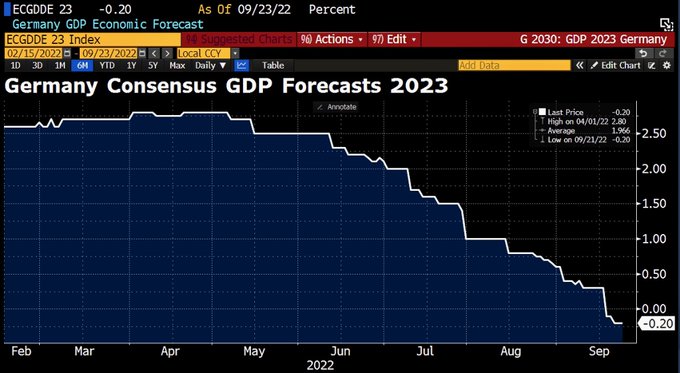German economy entered recession as inflation hurts consumers
BERLIN, May 24 (Reuters) - The German economy was in recession in early 2023 after households spending in Europe's economic engine finally succumbed to the pressure of high inflation.
Gross domestic product fell by 0.3% in the first quarter of the year when adjusted for price and calendar effects, a second estimate from the statistics office showed on Thursday. This follows a decline of 0.5% in the fourth quarter of 2022. A recession is commonly defined as two successive quarters of contraction.
German GDP data showed "surprisingly negative signals," Finance Minister Christian Lindner said on Thursday. He added that comparing Germany with other highly developed economies, the economy was losing potential for growth.
"I don't want Germany to play in a league in which we have to relegate ourselves to the last positions," he said, referring to the forecasts of the International Monetary Fund, which forecast a recession in 2023 only in Germany and Britain among European countries..." Reuters
Germany falls into recession as inflation hits economy
Persistent inflation has helped push Germany into recession in the first three months of the year, an upgrade to growth data shows.
Europe's largest economy was also badly affected when Russian gas supplies dried up after the invasion of Ukraine, analysts said.
The economy contracted by 0.3% between January and March, the statistics office said.
That followed a 0.5% contraction in the last three months of last year.
A country is deemed to be in recession when its economy shrinks for two consecutive three-month periods, or quarters.
"Under the weight of immense inflation, the German consumer has fallen to his knees, dragging the entire economy down with him," said Andreas Scheuerle, an analyst at DekaBank.
- Germany's inflation rate stood at 7.2% in April, above the euro area's average but below the UK's 8.7%.
Higher prices have weighed on household spending on things such as food, clothing and furniture. Industrial orders are also weaker, reflecting the impact of higher energy prices on businesses.
"The persistence of high price increases continued to be a burden on the German economy at the start of the year," the federal statistics agency Destatis said in a statement.
Originally, the agency had estimated zero growth for the first quarter of this year, suggesting Germany would side-step a recession.
However, the revised figures showed household spending was 1.2% lower than in the previous quarter.
- Government spending was 4.9% lower, and car sales also fell after government grants for electric and hybrid cars were scaled back.
The recession was less severe than some had predicted, given Germany's heavy reliance on Russian energy. A mild winter and the reopening of China's economy, helped ease the impact of higher energy prices.
- Private sector investment and exports rose, but that was not enough to get Germany out of the "danger zone" for recession, analysts said.
- "The early indicators suggest that things will continue to be similarly weak in the second quarter [of 2023]," said LBBW bank analyst Jens-Oliver Niklasch.
However, the German central bank, the Bundesbank, expects the economy to grow modestly in the April to June quarter, with a rebound in industry offsetting stagnating consumer spending.
The IMF has predicted that Germany will be the weakest of the world's advanced economies, shrinking 0.1% this year, after it upgraded its forecast for the UK from minus 0.3% to growth of 0.4%.




No comments:
Post a Comment